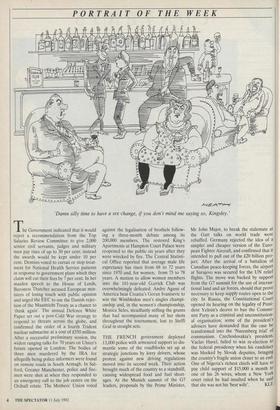PORTRAIT OF THE WEEK
'Damn silly time to have a sex change, if you don't mind me saying so, Kingsley.'
The Government indicated that it would reject a recommendation from the Top Salaries Review Committee to give 2,000 senior civil servants, judges and military men pay rises of up to 30 per cent; instead the awards would be kept under 10 per cent. Dentists voted to curtail or stop treat- ment for National Health Service patients in response to government plans which they claim will cut their fees by 7 per cent. In her maiden speech to the House of Lords, Baroness Thatcher accused European min- isters of losing touch with public opinion and urged the EEC to use the Danish rejec- tion of the Maastricht Treaty as a chance to 'think again'. The annual Defence White Paper set out a post-Cold War strategy to respond to threats across the globe, and confirmed the order of a fourth Trident nuclear submarine at a cost of £550 million. After a successful preliminary session, the widest ranging talks for 70 years on Ulster's future opened in London. The bodies of three men murdered by the IRA for allegedly being police informers were found on remote roads in South Armagh. In Sal- ford, Greater Manchester, police and fire- men were shot at when they responded to an emergency call to the job centre on the Ordsall estate. The Mothers' Union voted
against the legalisation of brothels follow- ing a three-month debate among its 200,000 members. The restored King's Apartments at Hampton Court Palace were reopened to the public six years after they were wrecked by fire. The Central Statisti- cal Office reported that average male life expectancy has risen from 68 to 72 years since 1970 and, for women, from 75 to 78 years. A motion to allow women members into the 161-year-old Garrick Club was overwhelmingly defeated. Andre Agassi of America beat Croatia's Goran Ivanisevic to win the Wimbledon men's singles champi- onship and, in the women's championship, Monica Seles, steadfastly stifling the grunts that had accompanied many of her shots throughout the tournament, lost to Steffi Graf in straight sets.
THE FRENCH government deployed 13,000 police with armoured support to dis- mantle some of the roadblocks set up at strategic junctions by lorry drivers, whose protest against new driving regulations moved into its second week. Their action brought much of the country to a standstill, causing widespread food and fuel short- ages. At the Munich summit of the G7 leaders, proposals by the Prime Minister, Mr John Major, to break the stalemate at the Gatt talks on world trade were rebuffed. Germany rejected the idea of a simpler and cheaper version of the Euro- pean Fighter Aircraft, and confirmed that it intended to pull out of the £20 billion pro- ject. After the arrival of a battalion of Canadian peace-keeping forces, the airport at Sarajevo was secured for the UN relief flights. The move was backed by support from the G7 summit for the use of interna- tional land and air forces, should that prove necessary to keep supply routes open to the city. In Russia, the Constitutional Court opened its hearing on the legality of Presi- dent Yeltsin's decree to ban the Commu- nist Party as a criminal and unconstitution- al organisation; some of the president's advisers have demanded that the case be transformed into the 'Nuremberg trial' of communism. Czechoslovakia's president, Vaclav Havel, failed to win re-election to the federal presidency when his candidaeY was blocked by Slovak deputies, bringing the country's fragile union closer to an end. One of Nigeria's richest chiefs will have to pay child support of $15,000 a month to one of his 26 wives, whom a New York court ruled he had insulted when he said that she was not his 'best wife'.


















































 Previous page
Previous page